
Gyoza roasted to a fine crisp together with beer... truly a match made in heaven. Even when the sweltering summer heat saps you of your motivation to eat or drink, many people would be okay if it’s gyoza.
In actual fact, boiled gyoza are much more popular in the dish's birthplace, China, while the fried style - that is ubiquitous in Japan - is rather rare. Some might conclude that Chinese tourists would thus not like Japan’s fried gyoza, but it seems that many do appreciate the variation on their local treat.
So, we followed Ms.Qin from China, who is in love with dumplings, as she tried out Tokyo’s all-you-can-eat gyoza course!
This time, taking on the gyoza challenge is our friendly Guangzhou born Ms. Qin
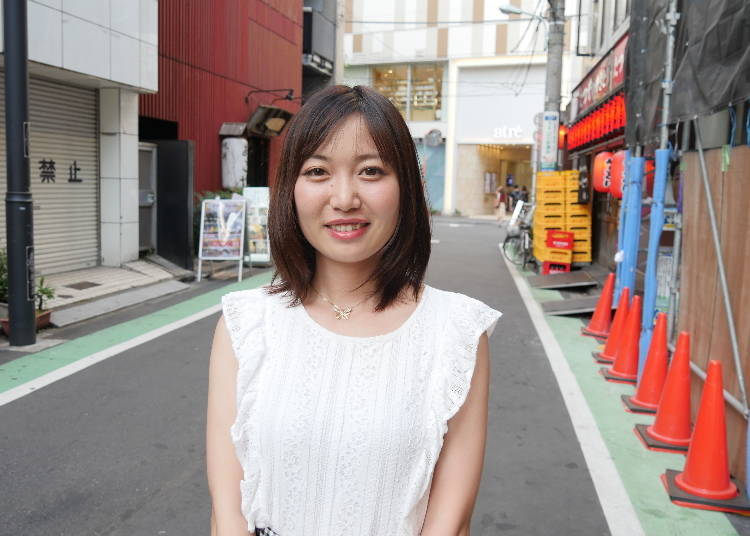
“I love gyoza! While I do eat a lot of Japanese gyoza, we generally only cook boiled gyoza and not any other types. After buying some chicken bones and making soup stock from it, we make our gyoza from that. The fillings are made with pork, Chinese chives, and mushrooms mixed well together. Of course, we don’t make the skin, but we still pride ourselves in making it properly!”
Seems like we have a picky expert this time. The target of this gyoza maniac’s assessment is the restaurant “Shichifuku Gyoza-ro” located 2 minutes away from Ebisu station by foot. As the name suggests, is a Chinese eatery specializing in gyoza, with a whopping 11 varieties of their famed gyoza! From the standard fried gyoza to boiled gyoza, and even some eccentric types, the variety is nothing to scoff at.

“Shichifuku Gyoza-ro” ran a promotion on every 7th day of the month for a gyoza buffet for 777-yen with a 70-minute time limit all the way till the end of September, which has proven to be a hit.

While we were sad to hear about the news of the promotion ending on September, we at LIVE JAPAN managed to try it out before it ended. Made with Japan’s prized Sangenton pork, and selling 400 plates of 2500 to 3000 pieces daily,

On the first floor are the counter seats, where you can watch as your gyoza is prepared by the staff in front of your eyes.
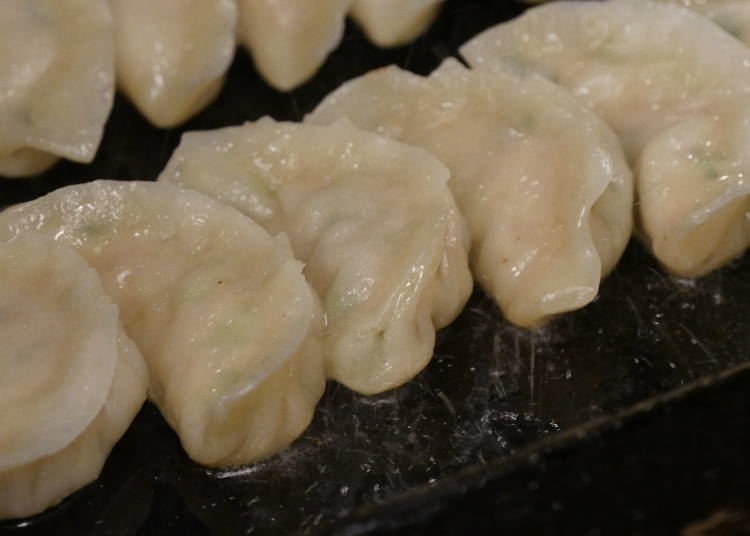
The 2nd and 3rd floors are all table seats, so large groups of adults are welcome as well. Female customers are overwhelming, but Western tourists also seem to frequent the place as well.
The all-you-can-eat course featured “Shichifuku gyoza”, “coriander gyoza”, “pork-perilla-cheese gyoza”, “fried gyoza”, “boiled gyoza”, “boiled coriander gyoza”, as well as “pork-perilla gyoza”, for a total of 8 different gyoza variations to feast on!

As a exception for this visit, all 8 varieties of gyoza were served together.
Without further ado, we started the challenge! Will the gyoza from Shichifuku Gyoza-ro satisfy our gyoza queen Ms. Qin? How many plates will she devour??
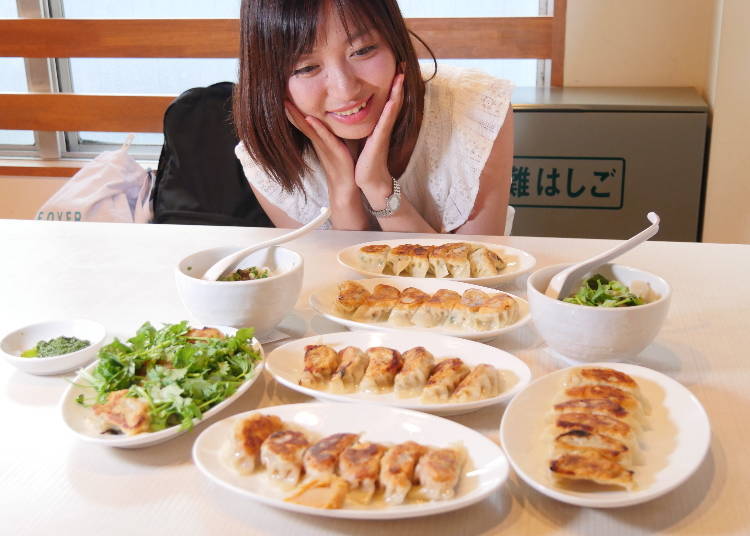
“Against my love for gyoza, this much is a cakewalk!”
■Shichifuku gyoza
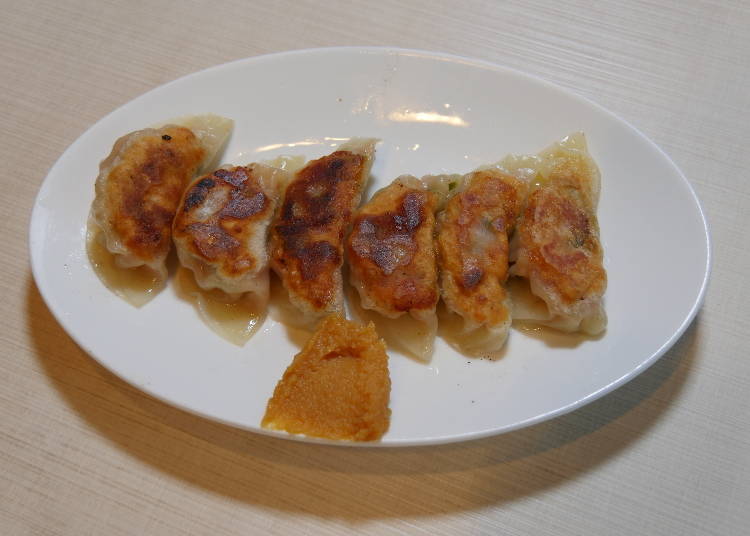
First up we tried the gyoza bearing the store name, the “Shichifuku gyoza”. What makes it unique is the miso dip that comes with it.

“Whoops, I added a bit too much miso there, the taste is a little overpowering now. That aside though, this is pretty good. I wonder if it’s because of the ginger. The minced meat is also chopped finely, something meat lovers might appreciate.”
Seems like the garlic-less ginger-full Shichifuku gyoza’s strong point is in the meat. Garnish it with your preferred helping of miso.
Boiled gyoza
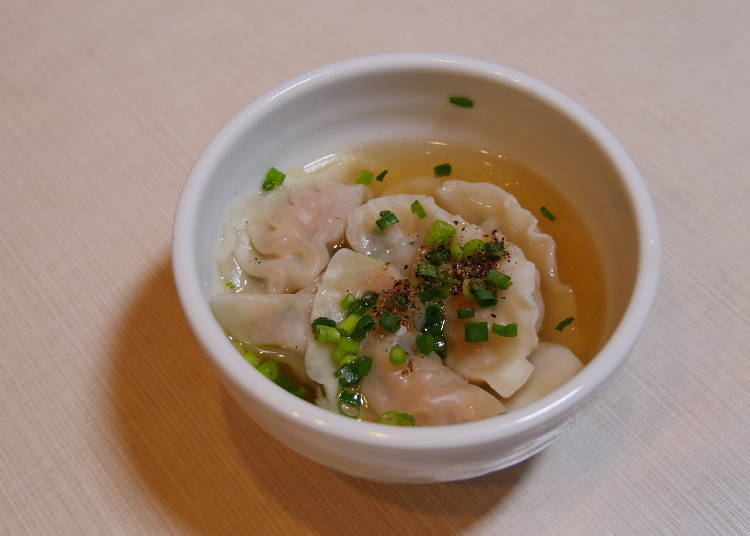
Next up is the boiled gyoza. As someone who makes her own boiled gyoza, how will Japan’s fare in her taste buds?
“Ohh, this is good! They’re very generous with the meat. They held back on the greens and crammed in more meat, like the wanton in China. I really dig it. The soup is also fragrant and the taste of the chicken stock comes out properly, blending really well with the pepper and sesame oil!”
Shichifuku Gyoza-ro’s boiled gyoza seems to pass Ms. Qin’s taste tests with flying colors. The staff watching over her also heaved a sigh of relief after her reaction.
“It’s plenty good on its own, but personally I like things slightly spicier. Can I get some chili oil?”
Yep, Ms. Qin loves spice in her life. Grabbing the jar of homemade chili paste on the table, she immediately got to adjusting the taste to her preference.
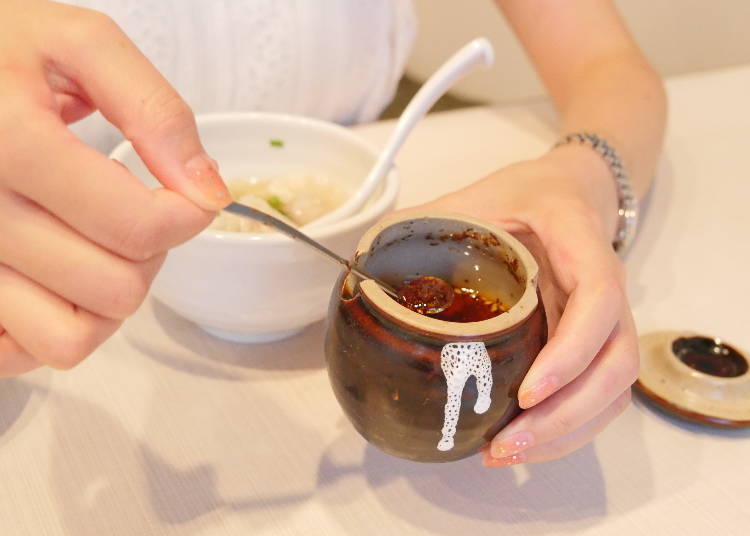
“Mmmm it got even better after adding the chili! This homemade paste uses star anise, I see. Authentic! The skin is also thin, just to my liking. The gyoza here might even be better than the worse ones in China!”
A rave review. The homemade chili oil Ms. Qin used to personalize her gyoza seems to be made with cinnamon, star arise, as well as cassia. Even after this she made use of the spicy paste often.
Boiled coriander gyoza
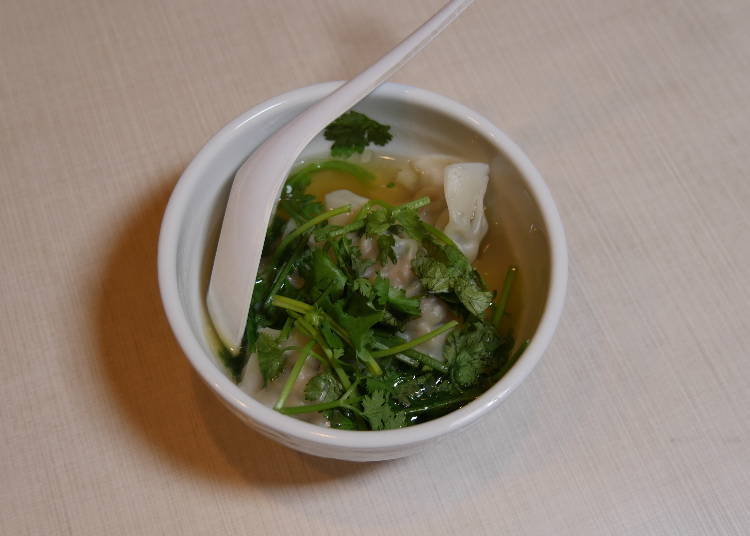
Next in line is the “boiled coriander gyoza”. To Ms. Qin, who loves both boiled gyoza and coriander, this was a match made in heaven.
“Delicious!! It’s my first time trying coriander and gyoza together, but it’s really good! The coriander in the soup is crisp! There’s also coriander in the dumplings themselves, so for me this is the best. It just needs a little bit of spice...”
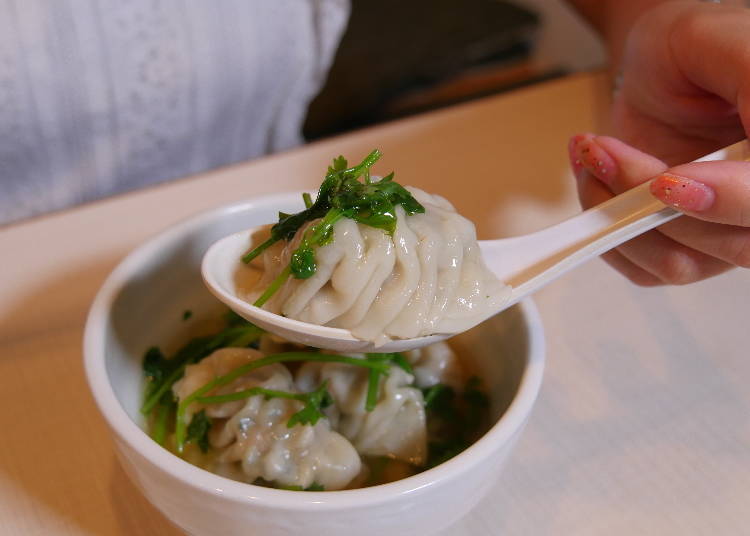
Ms. Qin looked quite interested in this as well, smiling contentedly as took each helping.した。
Coriander gyoza
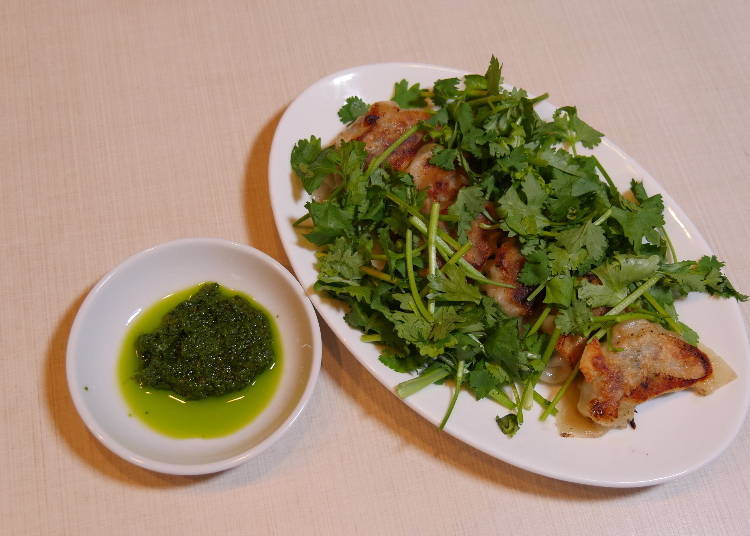
Continuing on, we have the fried version, “coriander gyoza”.
“Woah, they even added coriander to the sauce. Not only in the fillings, but even the garnish is raw coriander. It’s a coriander fest. The fried version has a stronger coriander taste than the boiled one. The dumpling skin for this one is crisp, which is delicious in its own right too.”
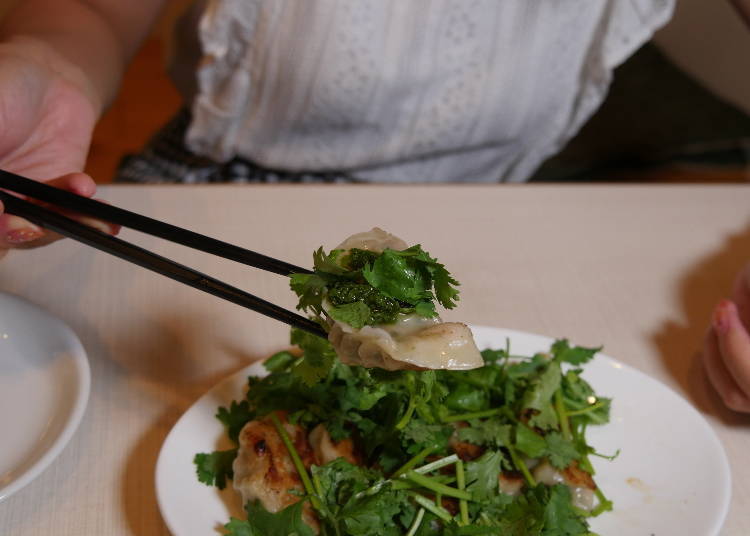
Using domestically grown coriander, this coriander gyoza is so popular it’s attracted many coriander lovers with its bountiful helpings. Just hearing this gives the impression of a hefty cost per gyoza...
Pork-perilla-cheese gyoza
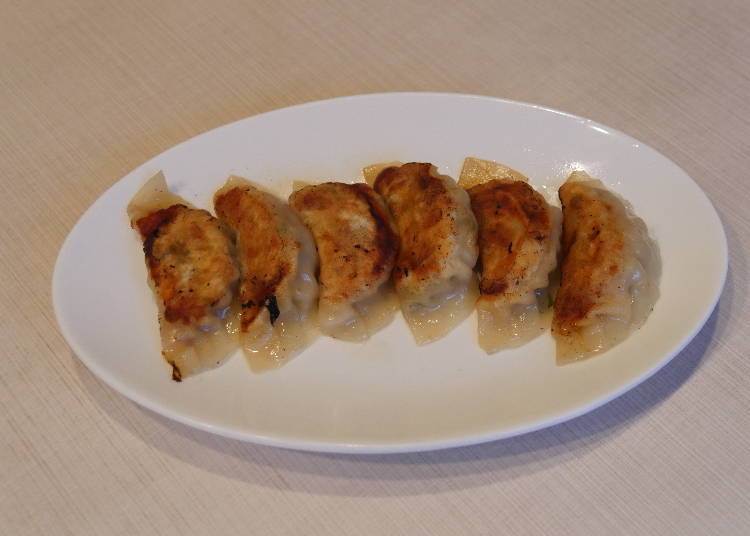
Moving on, we have the “pork-perilla-cheese gyoza”, filled with mozzarella cheese and perilla, a real hit among the ladies.
“Ooh, the cheese is really stretchy! Adding cheese to gyoza is pretty novel. Though it’s also kind of… sweet? Not something you usually taste in gyoza. This definitely wouldn’t sell in China. But well, it’s pretty good as dessert. I’d buy it if a bakery sold this. It reminds me of Chinese mooncakes.”
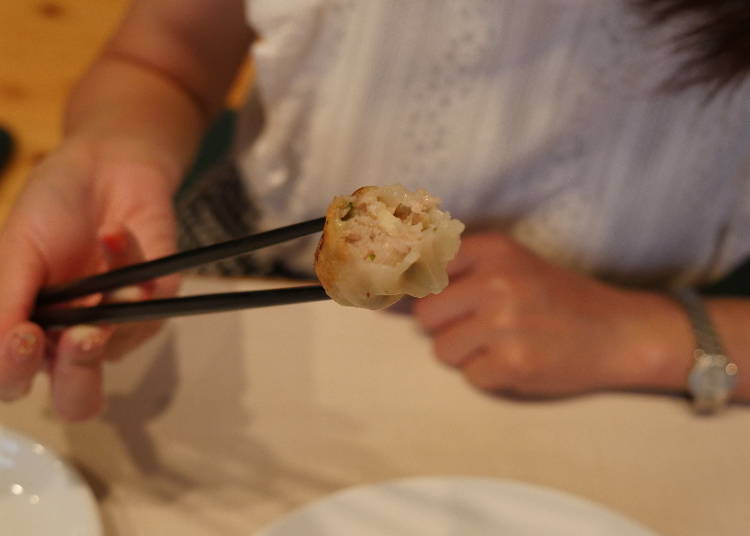
While comparing gyoza with mooncakes sounds a little iffy, our expert seemed satisfied with the dessert-like sweetness.
Pork Gyoza
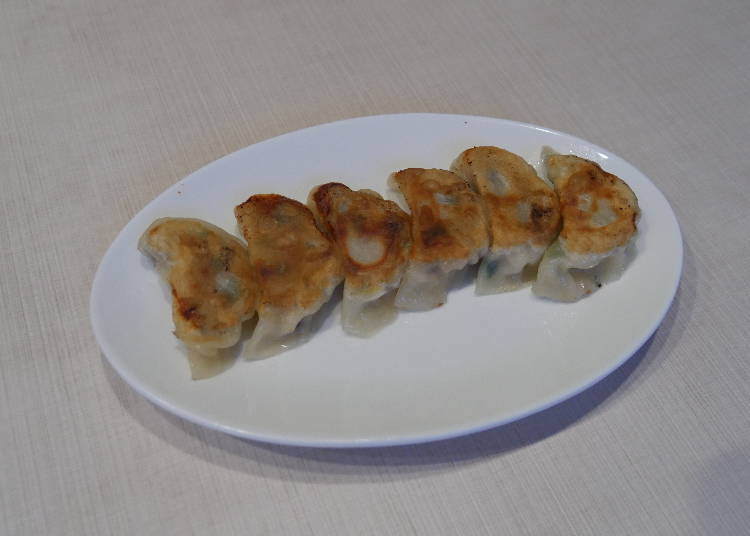
More than halfway through, we tried the pork gyoza, enhanced with garlic. After hearing that it uses garlic, our gyoza connoisseur looked visible excited but...
“I really like garlic, but I think they could have added a bit more here. In China we end to add garlic in the soup, or into the sauce itself. This one is a bit light and leaves me unsatisfied ...on that note, I’m hitting my limit...”
Despite the delicate face, Ms., Qin loves food with impact. The garlic seemed lacking in kick to her garlic-loving side. The Ebisu area where Shichifuku Gyoza-ro is it tends to use garlic moderately when making gyoza, but it seems to not match with Ms. Qin.
However, despite Ms. Qin’s initial declaration, it seems that she’s reached her limit. There’s still gyoza untried yet...
Fried gyoza
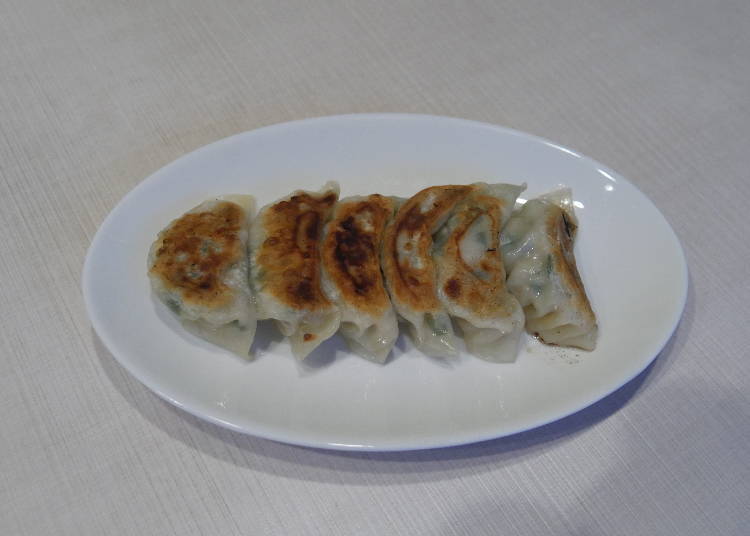
The last item on the course is the fried gyoza, stuffed chock-full with veggies. Hang in there Ms. Qin!
“At first glance, it’s quite green in color, which makes it resemble real Chinese cuisine. These fried gyoza have plenty of cabbage inside them, it’s good! There’s comparatively less meat than cabbage, chives, and spring onions. Chinese gyoza doesn’t have cabbage in them, though the Northern part makes it with Chinese cabbage and meat. This way of adding vegetables is refreshing,”
For the final gyoza, it seems to be quite different from that in China. Now that we’ve reached the end, just how much gyoza did she eat!? Forget about being worth the sheer actual cost of the meal...!
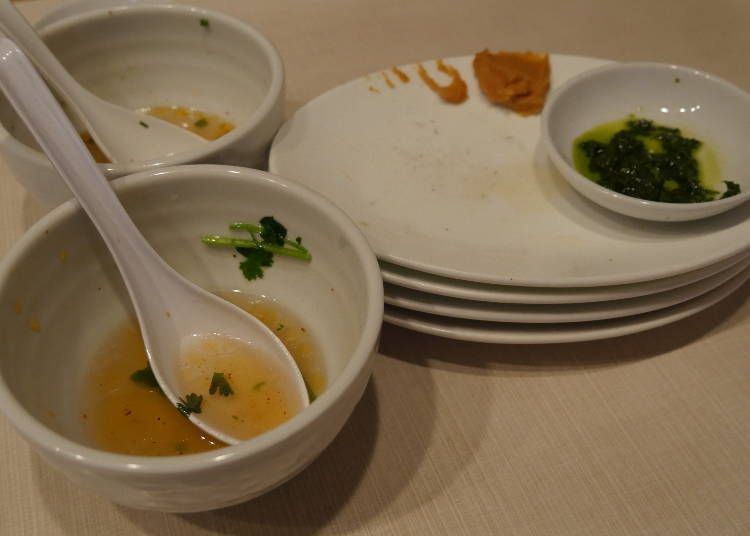
Even with a full belly, all the gyoza was respectfully finished as declared.
While Ms. Qin was on the gyoza buffet course, how much would all these cost normally?
Ordering them ala carte would be: Shichifuku gyoza 450-yen, boiled gyoza 450-yen, boiled coriander gyoza 480-yen, coriander gyoza 480-yen, pork-perilla-cheese gyoza 580-yen, pork gyoza 450-yen, pork-perilla gyoza 480-yen, fried gyoza 450-yen (all prices are tax inclusive).
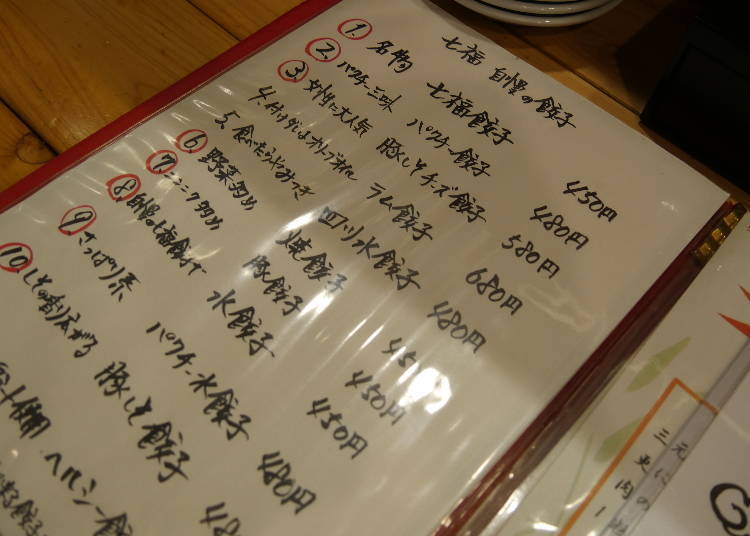
Basically, even the initial Shichifuku gyoza and boiled gyoza alone would cost you a hefty amount. Ms. Qin’s meal here would have cost a total of 3820-yen in terms of regular pricing.
“I’m so full... but it was really good! A shame I couldn’t get more, but it was definitely worth it.”

“Out of all the gyoza I’ve had here, my favorite was the boiled coriander gyoza. The regular boiled gyoza was better than some I’ve had in China. The ginger-full Shichifuku gyoza was also pretty good, while the other original gyoza were certainly flavors you’ll never get in China. I want to come back again.”
It seems that our Chinese gyoza fanatic Ms. Qin has given her seal of approval!
Shichifuku Gyoza-ro’s plans for the future
Today’s review was about Shichifuku Gyoza-ro’s 777-yen gyoza buffet course. However, while this particular course has been discontinued, they seem to preparing a new one in the near future.
While the previous course was limited to every 7th of the month, the new course is slated to be available daily! Not only that, the time limit is also extended to 90 minutes, 20 minutes longer than the previous course! That means more room for more gyoza!
“Shichifuku Gyoza-ro” 17:00 – 19:00 All-you-can-eat
Vacate store by 19:00/Buffet lasts for a maximum of 90 minutes
Regular: 1280-yen
Student: 980-yen (Bring along your student I.D.)
• All customers are required to purchase at least one drink
This really tempts you to get off work or school early!
We hope you take the time off to visit this Chinese gyoza maniac-certified gyoza shop’s buffet.
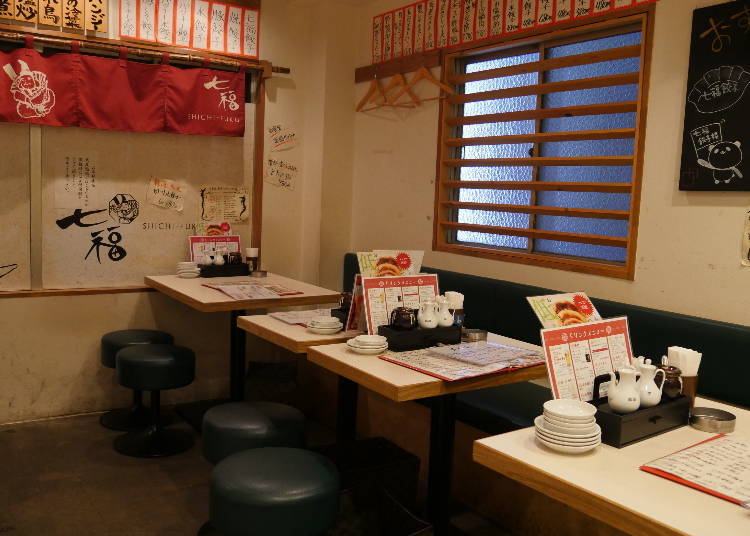
Shichifuku Gyoza-ro
Address: Tokyo-to Shibuya-ku Ebisuminami 1-8-10
Tel: 03-6303-0910
Hours: 17:00 – 24:00 (Last Order: 23:30)
Open daily
Article by Matsumura Chiemi
*Prices and options mentioned are subject to change.
*Unless stated otherwise, all prices include tax.
Popular Tours & Activitiess
Recommended places for you
-

Ueno Zoo (Ueno Zoological Gardens)
Zoos, Aquariums & Botanical Gardens
Ueno
-

Tokyo Disney Sea®
Theme Parks
Chiba Suburbs
-

Senso-ji Temple
Temples
Asakusa
-

The Tokyo Station Marunouchi Building
Landmarks
Tokyo Station
-

Tokyo Metropolitan Government
Landmarks
Shinjuku
-

The Imperial Palace
Other Architecture
Tokyo Station
-

PokéPark KANTO Is Finally Open! Tokyo's New Pokémon World Starts Before You Even Arrive (2026)
by: Guest Contributor
-

Farewell, Heavy Suitcases! Keisei Ueno’s New Service Makes Your Last Day in Tokyo Totally Hands-Free
by: Guest Contributor
-

A New Tokyo Landmark Is Coming in 2026, and It's Built for Modern Travelers
by: Guest Contributor
-

To the Holy Land of Kawaii! Odakyu Tama Center Station Is Becoming a Dreamy Sanrio Wonderland
by: Guest Contributor
-

Where to Buy a Japanese Kitchen Knife? Why Travelers Choose MUSASHI JAPAN's 14 Stores in Tokyo, Kyoto, and Nara
by: Guest Contributor
-

Top 3 OSHI MAPs for the Best Matcha and Sweets in Tokyo
by: Guest Contributor
-

Japan's Bath Culture: Tips You Should Know!
-

Picnic in Tokyo: Five Unique Bakeries in Yoyogi-Uehara
-
Ad

What to do if you’re in Tokyo when a disaster strikes? Get familiar with evacuation sites and shelters
by: Miyu Shimada
-

Kaigui (eating food right after buying it) in Azabu-Juban, right in the middle of downtown Tokyo
-

8 Unfamiliar (But Totally Normal) Customs in Japan!
-

6 Fun Things to Do at Tokyo's World-Famous Tsukiji Outer Market!
- #best ramen tokyo
- #what to buy in ameyoko
- #what to bring to japan
- #new years in tokyo
- #best izakaya shinjuku
- #things to do tokyo
- #japanese nail trends
- #what to do in odaiba
- #onsen tattoo friendly tokyo
- #daiso
- #best sushi ginza
- #japanese convenience store snacks
- #best yakiniku shibuya
- #japanese fashion culture
- #best japanese soft drinks












